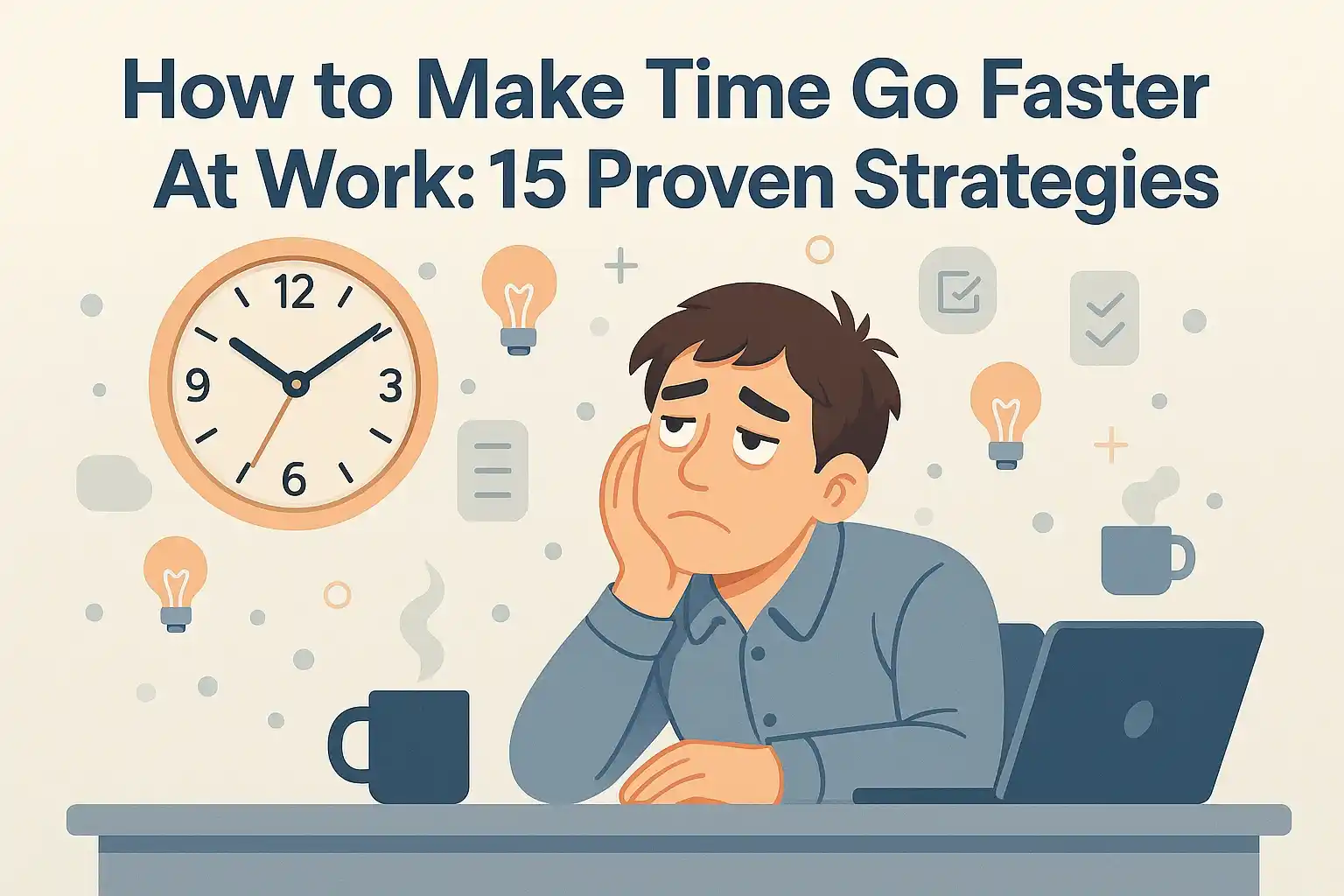

Ever find yourself glancing at the clock, wondering how it’s only 10:15 AM? You’re not alone. A 2023 survey revealed that 46% of U.S. employees feel bored at work at least three days a week . This pervasive boredom not only drags down morale but also hampers productivity. In fact, nearly half of American workers report experiencing burnout, with workload and staff shortages being primary culprits.
Whether you’re a remote worker, a young professional, or a team leader, the monotony of the workday can be challenging. This begs the question: how to make time go faster at work? The good news is that there are proven strategies to make your workday more engaging and seemingly fly by.
In this blog, we’ll delve into 15 effective techniques to help you stay focused, energized, and productive throughout your day, and thus, make time go by fast at work.
Ready to transform your work experience and make days go by faster? Let’s dive in.
We’ve all had those days—watching the clock, counting the hours, feeling like time is crawling. But why does this happen? The answer lies in how our brain perceives time based on engagement, emotion, and focus.
When your work feels repetitive or unchallenging, your brain has little stimulation to latch onto. This lack of mental engagement slows your perception of time.
Boredom stretches minutes into what feels like hours because there’s no cognitive “flow” keeping you immersed. A 2023 survey by SHRM found that 46% of U.S. workers experience boredom at work at least three days a week. This disengagement can diminish attention and memory, leading to decreased productivity.

From email notifications to Slack pings and noisy coworkers, distractions disrupt your focus. Research in Frontiers in Human Neuroscience indicates that such distractions can impair working memory and task performance, making time feel elongated.
Each interruption pulls you out of deep work and resets your mental clock, making the day feel longer and more fragmented.
Ironically, the more you check the time, the slower it seems to pass. Focusing on the clock can heighten your awareness of every passing second, which magnifies the feeling of slowness.
It’s like waiting for water to boil—it always feels longer when you’re staring at the pot.
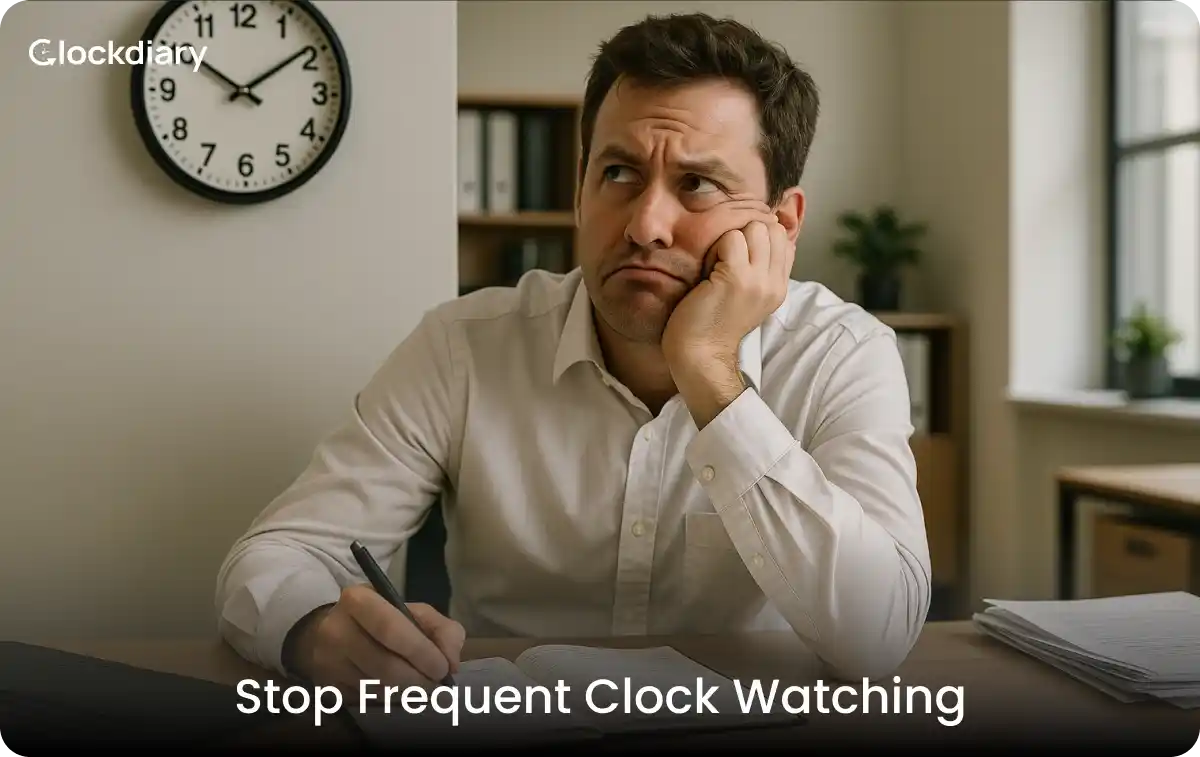
Dr. David Eagleman, in his book Incognito, discusses how new experiences can make time feel more expansive due to the brain processing more information. Interestingly, time feels slower when you’re doing something new because your brain is working harder to process unfamiliar information.
This can be especially true during onboarding or transitions to a new role, where every task feels like a mental workout.
Stress, anxiety, or low mood can distort time perception. Research suggests that high-stress situations can make time feel like it’s moving slower, impacting overall productivity.
Negative emotions slow time because they increase self-awareness and reduce your ability to stay “in the zone.” Conversely, positive emotions can make days go fast.
Ruminating over past mistakes or future uncertainties creates mental noise. This constant inner dialogue slows your perception of time because you’re mentally split between the present and your thoughts.
Understanding these factors is key to make time go faster and reclaiming your workday—and we’ll show you how.
Feeling like your workday drags on endlessly? You’re not alone. Many professionals experience this, especially when tasks become monotonous or when distractions abound.
The good news is that there are proven strategies to make your workday feel shorter and more engaging. Let’s delve into 15 effective techniques to make time fly at work.
“Time is the scarcest resource and unless it is managed nothing else can be managed.” — Peter Drucker
One of the quickest ways to make time go quick is to focus on getting things done. Shifting your mindset from “just getting through the day” to “making meaningful progress” boosts your sense of purpose.
The 90/90/1 rule, introduced by productivity expert Robin Sharma, suggests dedicating the first 90 minutes of your workday to your most important task for 90 consecutive days.
When you’re productive, you’re mentally engaged and less likely to be watching the clock. Use task lists or productivity apps like Clockdiary to visualize your progress throughout the day.
The more you see yourself achieving, the more momentum—and time—you gain.
“Only put off until tomorrow what you are willing to die having left undone.” — Pablo Picasso
A Forbes article highlights that 78% of workers procrastinate despite increased anxiety, leading to a cycle of stress and inefficiency.
Procrastination make time go slower because it fills your day with anxiety and avoidance. You end up spending more time worrying about the task than actually doing it.
Break this cycle by using techniques like the Pomodoro Technique, where you work in 25-minute focused sprints with short breaks in between.
Starting is often the hardest part—once you begin, the work often flows and time passes faster.
“Setting goals is the first step in turning the invisible into the visible.” — Tony Robbins
Setting clear, achievable goals gives your day structure and direction. Goal tracking apps can prove to be a boon here.
When you have something tangible to work toward, you’re more motivated and focused. This structure prevents time from dragging and helps you avoid the feeling of aimlessness that makes hours stretch endlessly.
Use SMART goals (Specific, Measurable, Achievable, Relevant, and Time-bound) to stay on track, and thus, make time at work go faster.
“Innovation is saying no to a thousand things.” — Steve Jobs
Just as important as your to-do list is your “not to do” list. This helps you eliminate time-wasting habits and low-priority tasks that don’t move the needle. It is advised to use the Eisenhower Matrix technique to distinguish between high-priority and low-priority tasks.
Identify activities that drain your energy or cause distraction—such as mindless scrolling, multitasking, or unnecessary meetings—and make a conscious effort to avoid them to make work go faster.
“The journey of a thousand miles begins with one step.” — Lao Tzu
Large projects can feel overwhelming and time-consuming. Break them into smaller, manageable tasks that you can complete quickly. Task management software like Clockdiary comes in handy here.
This keeps you moving and gives you frequent feelings of accomplishment, which make time go faster while doing work. Plus, it keeps procrastination at bay.
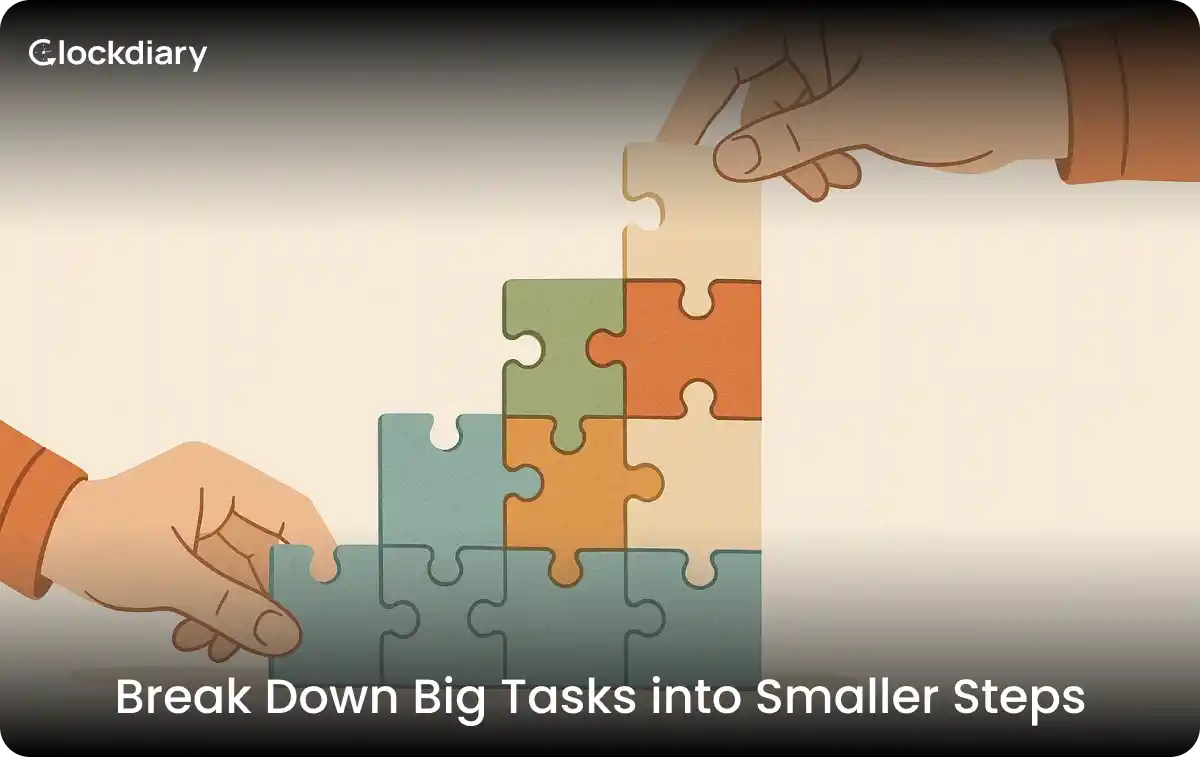
“You may delay, but time will not.” — Benjamin Franklin
Time tracking isn’t just for productivity geeks. Understanding where your hours go helps you optimize your workday.
Breeze.pm notes that effective time tracking can reduce productivity leaks by up to 80%, potentially increasing revenue by 61%.
Use time tracking apps like Clockdiary or a simple spreadsheet to see which tasks eat up your time. With this insight, you can make better decisions about how to schedule your day for maximum efficiency and engagement.
“Routine, in an intelligent man, is a sign of ambition.” — W. H. Auden
Routines provide structure, and structure makes time run faster at work. When your body and brain know what to expect, you waste less energy deciding what to do next.
Establish a consistent start to your day, batch similar tasks together, practice time blocking for specific tasks, and schedule regular times for breaks and deep work.
Predictability reduces decision fatigue and helps you move through the day with ease.
“The successful warrior is the average man, with laser-like focus.” — Bruce Lee
TeamStage reports that workplace distractions can lead to substantial time loss and decreased efficiency.
Distractions reset your mental focus and stretch the day unnecessarily. Every time you’re pulled away from a task—whether it’s a text, an email, or background noise—it takes time to refocus.
Turn off non-essential notifications, set your phone to “Do Not Disturb,” and create a workspace that minimizes interruptions. Consider using noise-canceling headphones or productivity music playlists to stay in the zone. Productivity Chrome extensions are also a good option. This will make time run faster at work.
“Pleasure in the job puts perfection in the work.” — Aristotle
Flow is the sweet spot where you’re fully immersed in a task and lose track of time. To enter flow, work on tasks that challenge you but aren’t overwhelming.
Eliminate distractions, set clear goals, give yourself enough time to dive deep and track daily activities. When you’re in flow, your productivity spikes and make time at work go faster.
“Live as if you were to die tomorrow. Learn as if you were to live forever.” — Mahatma Gandhi
Learning something new or improving a current skill keeps your brain stimulated and makes time go quicker. Springboard’s survey indicates that upskilling and reskilling are top tactics HR leaders plan to employ to address company skills gaps. This is absolutely essential to build a high performing team.
Whether it’s learning a new software, enhancing your communication skills, or mastering a workflow, personal growth adds meaning to your day. Plus, it boosts your confidence and job satisfaction.

“Creativity is intelligence having fun.” — Albert Einstein
Variety is the antidote to boredom. Mix up your workday with tasks that stimulate your brain. This could be brainstorming sessions, creative problem-solving, icebreaker questions, or even quick learning breaks.
Alternating between different types of work keeps your mind fresh and makes time go by faster. Exploring different types of team-building activities is also a good idea.
“The greatest weapon against stress is our ability to choose one thought over another.” — William James
Sometimes, a change of scenery is all it takes to refresh your mind and reset your internal clock.
If you work remotely, move to a different room or a nearby cafe. In an office setting, consider working from a different desk, meeting room, or outdoor area.
A new environment boosts focus and makes the day feel less monotonous. This is a great way to make days go quicker.
“Almost everything will work again if you unplug it for a few minutes… including you.” — Anne Lamott
Working non-stop can actually make the day drag on. Strategic breaks help reset your brain and keep your energy levels high.
Try the 52/17 rule—52 minutes of focused work followed by a 17-minute break.
Use breaks to stretch, take a short walk, or disconnect from screens. These pauses make your work sessions feel sharper and more productive, which in turn, makes time go by faster at work.
“The bad news is time flies. The good news is you’re the pilot.” — Michael Altshuler
Constantly checking the time only amplifies the sensation that it’s moving slowly. Instead, set time blocks for tasks and only check the time at the end of each block.
Use time blocking apps like Clockdiary, so you’re not tempted to look at the clock. This builds discipline , keeps you focused on what matters, and make a day go by fast.
“People work for money but go the extra mile for recognition, praise, and rewards.” — Dale Carnegie
Incentives work wonders for motivation. Give yourself small rewards throughout the day for hitting milestones—whether it’s a treat, a walk, or a quick social scroll.
These rewards break the monotony and give you something to look forward to. It creates a rhythm that makes time go quickly and enjoyably.

Why does time seem to drag on some days and fly by on others? Experts in neuroscience and psychology have long explored how our brains perceive time—and the findings can help reshape how we approach our workdays.
According to neuroscientists, time perception is closely tied to how much information the brain is processing. When you’re focused and deeply engaged, your brain is busy encoding new experiences, which makes time go by quick.
Dr. David Eagleman, a neuroscientist at Stanford University, explains that the brain doesn’t have a central clock. Instead, it relies on memory and attention to construct time.
So, when tasks are novel or mentally stimulating, time feels compressed. This means boredom slows time not because of the clock itself—but because your brain is under-stimulated.
From a psychological standpoint, how you feel emotionally plays a huge role. Studies have shown that stress, anxiety, and low mood tend to slow down time perception. In contrast, positive emotional states can make the time go by faster.
Psychologist Philip Zimbardo’s research on time perception revealed that people with a “present-focused” mindset (those who stay engaged in the now) tend to experience time more positively than those fixated on the past or future.
Furthermore, productivity research supports the idea that structured days, clear goals, and flow states not only boost output but also make time pass faster at work. The more “in control” people feel over their time, the more efficiently and enjoyably they move through it.
In short, both brain science and psychology agree: how fast or slow time feels at work depends less on the clock—and more on your attention, mindset, and emotional engagement.
If you’re looking to enhance your productivity and make your workday more efficient, Clockdiary offers a comprehensive suite of features designed to help you manage your time effectively, and, in turn, make time go faster at work.
Clockdiary allows you to track time effortlessly with its one-click timer. Whether you’re working on a desktop or mobile device, you can start and stop the timer as you work or enter hours manually. This flexibility ensures accurate time tracking across various tasks and projects, and thereby, make the time go by faster at work.
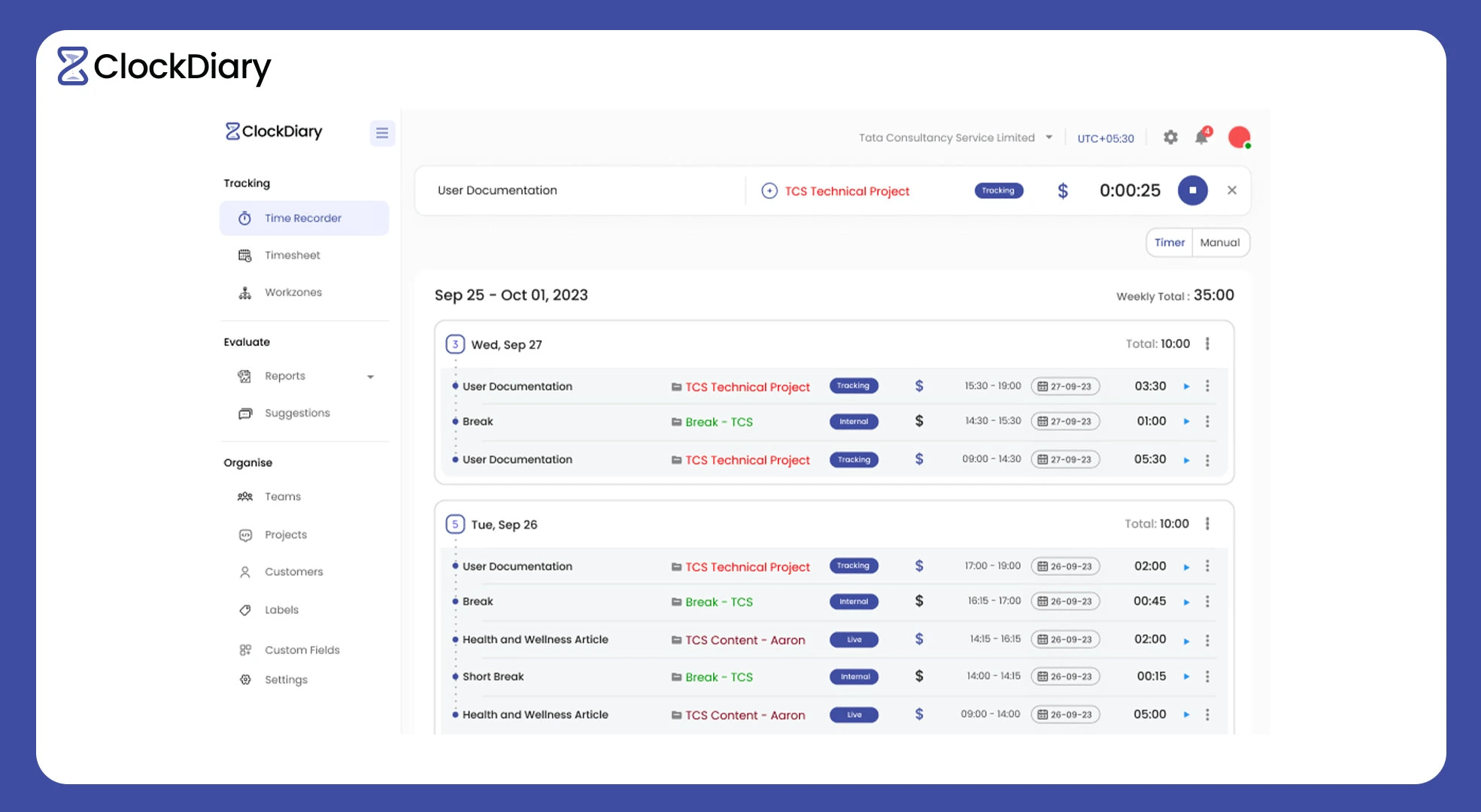
Quickly log weekly activities, categorize time spent on various projects, and add detailed notes to each entry, facilitating accurate tracking and reporting, and thus, make time go by faster at work.
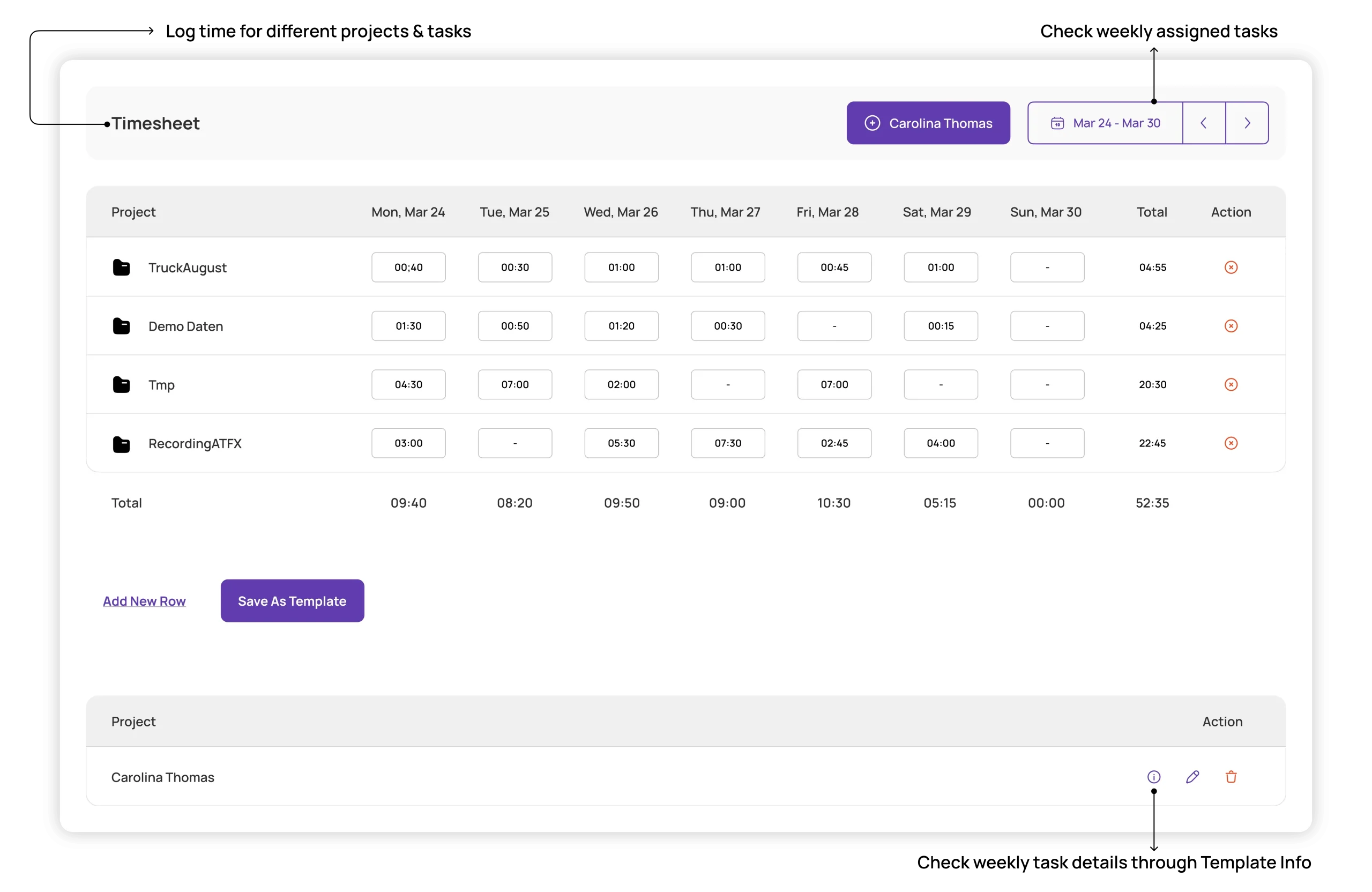
With Clockdiary’s superior reporting features, you can analyze where your time goes. The dashboard provides visual insights into your activities, helping you identify areas where you can improve efficiency.
You can generate detailed reports, filter data, and export them in formats like PDF, CSV, or Excel.
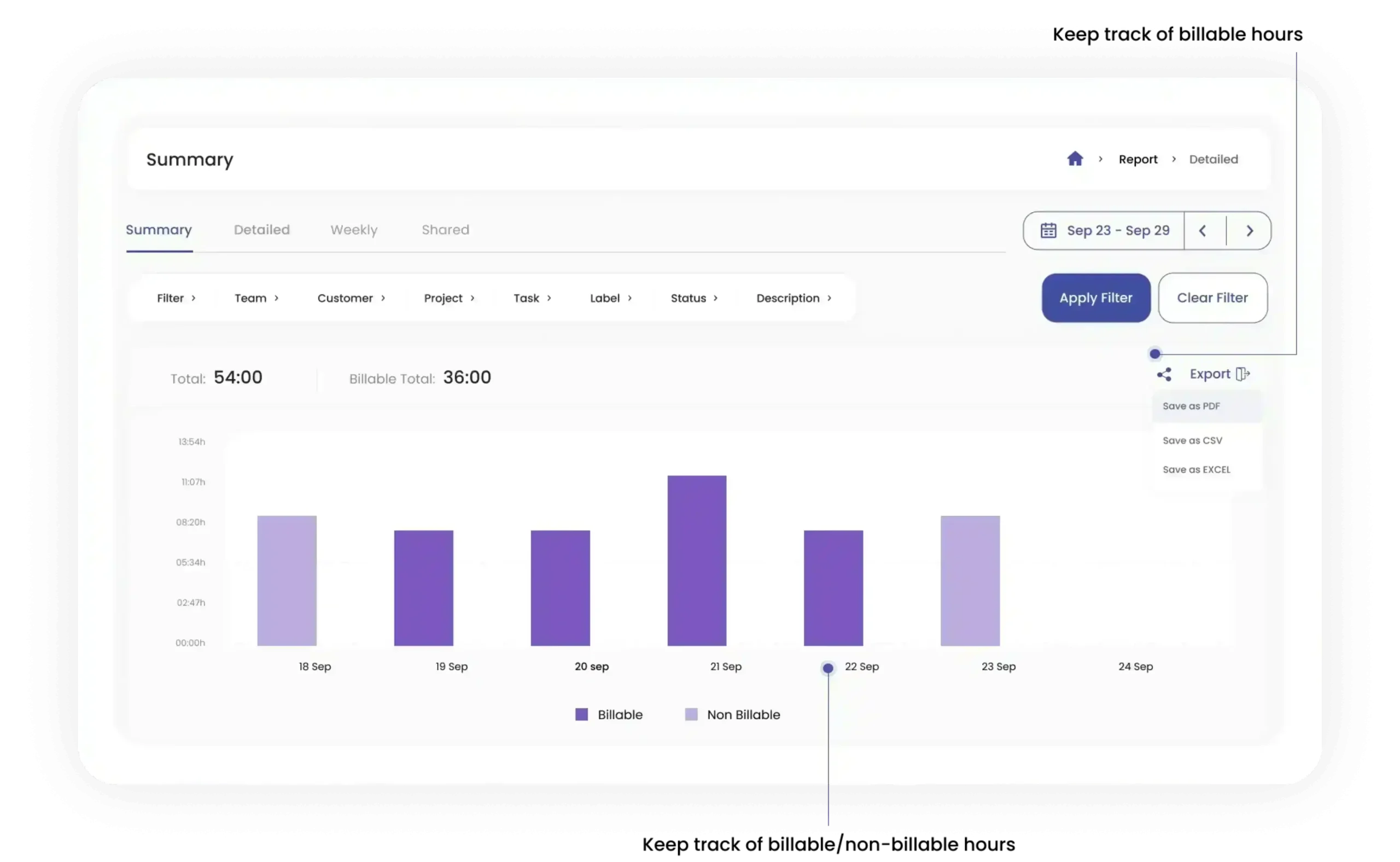
Clockdiary enables you to categorize time entries by projects and tasks, making it easier to manage workloads. You can set budgets, assign hourly rates, and monitor project progress, ensuring that you stay on track and within budget.
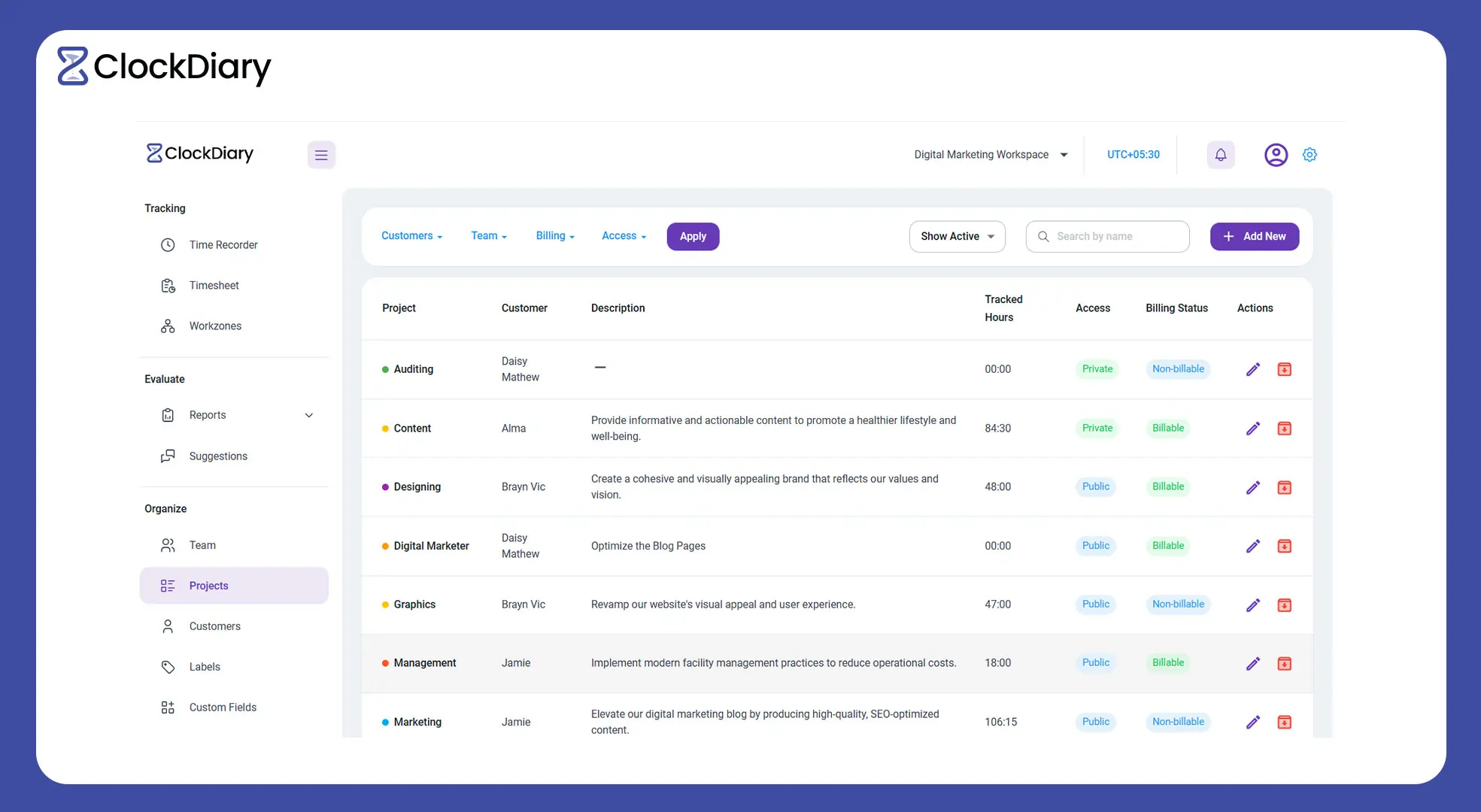
Monitor work patterns by capturing screenshots at regular intervals. Features like auto-tracking and idle detection help identify productivity trends and areas for improvement.
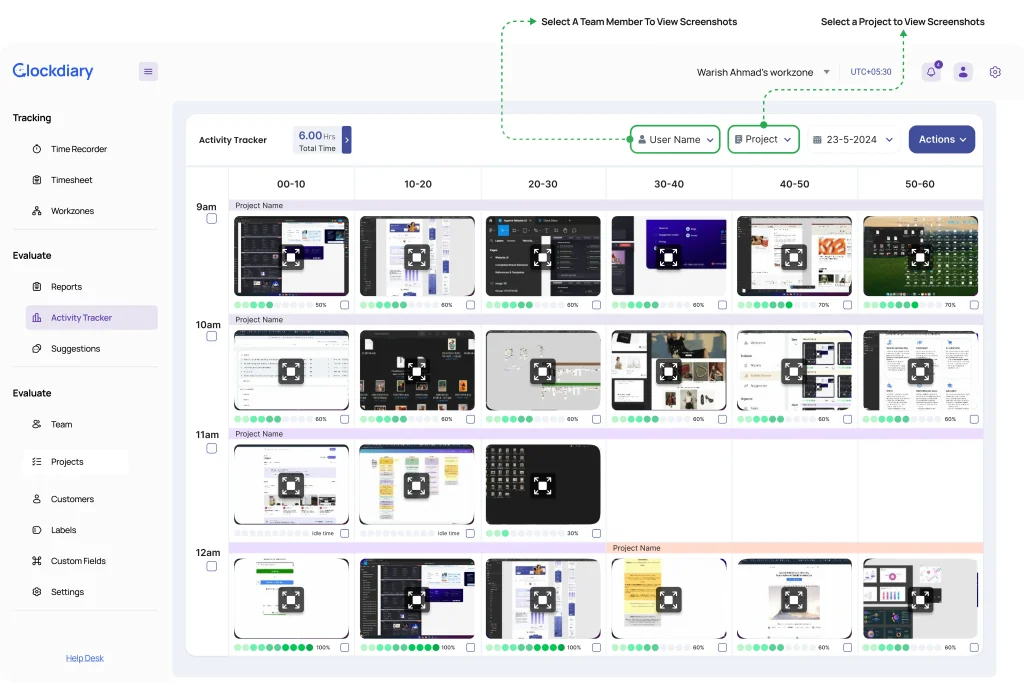
Automates time tracking and task management, reducing manual input and enhancing efficiency.
Utilize AI-driven analytics to assess team performance, identify roadblocks and optimize workflows, ensuring data-driven decision-making.
Clockdiary integrates seamlessly with numerous project and task management tools, including Trello, Slack, and Google Calendar. This integration allows you to track time directly within the apps you already use, streamlining your workflow.
By leveraging Clockdiary’s features, you can gain better control over your time, enhance productivity, and make your workday more efficient. So, what are you waiting for? Get in touch with us to make Clockdiary an integral part of your work life and make time go faster at work like never before.
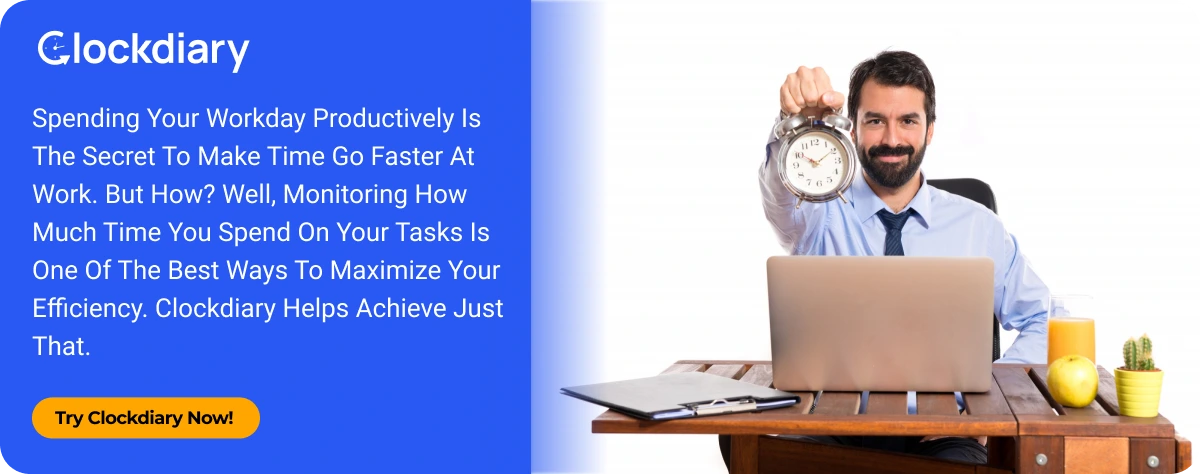
Frequently Asked Questions (FAQs):
To make time go faster at school, stay actively engaged by participating in class discussions, taking notes, and setting small goals for each subject. Mixing up study techniques, staying organized, and taking short mental breaks can also help keep your mind fresh and the day moving quickly.
To make time go faster as a cashier, stay mentally engaged by interacting with customers, setting mini-goals (like how many customers you serve per hour), and keeping your workspace organized. Listening to upbeat music (if allowed) and rotating tasks during downtime can also help break monotony and keep the day moving.
To make time go faster at home, stay mentally and physically engaged by tackling projects, learning new skills, or following a structured daily routine. Mixing in hobbies, light exercise, and meaningful breaks can help keep your day productive and prevent boredom from slowing down time.
To make time go faster when waiting for something, distract your mind with an engaging activity like reading, listening to music, or solving a puzzle. Staying mentally occupied reduces your focus on the passage of time, making the wait feel shorter.
To make time go faster at a fast food job, stay focused by setting small personal challenges, like speeding up order accuracy or improving teamwork during rush hours. Keeping a positive attitude, staying busy during slow periods with prep or cleaning tasks, and engaging with coworkers can also help the shift fly by.
To make time go faster in a warehouse job, keep your body and mind engaged by setting mini-goals, rotating tasks when possible, or listening to music or podcasts if allowed. Staying focused on efficiency and creating a rhythm in your work can make repetitive tasks feel quicker and more manageable
To make time go faster in retail, keep yourself engaged by organizing displays, restocking shelves, and setting hourly goals to stay productive. Chatting with customers, learning more about the products, and switching tasks when possible can also break monotony and help the day move along more quickly.